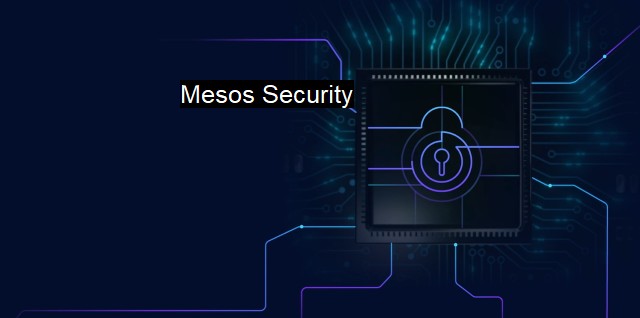What is Mesos Security?
Securing Apache Mesos: A Comprehensive Overview of Mesos Security and Best Practices for Protecting Distributed Systems
Mesos Security is a critical feature of the Apache Mesos system, which deals specifically with the area of cybersecurity and antivirus protection. Apache Mesos is a cluster manager that handles workflow and resource utilization, ensuring efficiency in large-scale operations. With the increasing amount of sensitive premeditated cyber-attacks and unintentional data leaks, Mesos Security emerges as a herculean component to maintain the integrity, confidentiality, and availability of data in these digital ecosystems.Mesos Security fundamentally plays three central roles in cybersecurity; authentication, authorization, and encryption. effective auditing and logging are also incorporated for system transparency and monitoring.
Running on open-source software, Mesos, like many other platforms, can be a target for malicious activities; hence authenticating the identity of interacting entities is the basic unit of security. Without proper authentication controls, an entity could pose as a master or agent, causing potentially irreversible chaos. Mesos Security negates such risks by enabling transport encryption and mutual authentication through industry-standard mechanisms such as Transport Layer Security (TLS), while Message Authentication Codes (MACs) and signature-based methods reinforce its secure data communication.
Following authentication is the authorization mechanism that focuses on application-based controls refining the access scope for each authenticated user and stipulating who gets to perform what operations. This tier considers the roles of individuals within an organization, ensuring that those who need access to certain sensitive areas have it, while stiff barriers prevent unwarranted access.
Mesos Security also employs state-of-the-art encryption techniques to provide an additional layer of security. The encryption of sensitive data, both at rest and in transit, is an absolute necessity to prevent the ease with which potential attackers could access the data. For data in transit, transport encryption ensures data sent across connections, either from agent to master or vice-versa, is protected from potential interception. Encryption at rest takes care of data stored within the system, rendering it useless to any unauthorized individuals who manage to bypass other security measures.
Auditing and logging are additional security measures that bolster the functionality of Mesos Security. Auditing enables the entire organization to track and maintain a record of who initiated what actions at any given moment, offering tools and abilities to detect and respond to risks or potential security breaches comprehensively and immediately. It provides assurance that security measures are being followed and operate successfully. Proper logging is key to find out what happened during a security incident, where and how it happened, and what the extent of the damage was, ensuring the potential to learn from attacks and refine the system accordingly.
Integration with popular infrastructure technologies such as Docker and Kubernetes is also key to Mesos Security. Docker and Kubernetes have their security configurations, but Mesos Security intends to harmonize these features, resulting in a more robust and secure network.
In terms of updates, patches, and system vulnerabilities, these are continually monitored due to the open-source nature of Mesos, which actually creates an environment where more eyes are inspecting the security features. Consequently, this enhances security, as a community of knowledgeable and concerned individuals thrives to keep the system secure and rectify any noticed vulnerabilities.
Mesos Security ensures the safe operation of data clusters managed by Apache Mesos. From the initial entry request into the system, every stage of interaction is authenticated, authorized, examined, and encrypted to keep the chances of a security breach falling to a minimum. It plays a crucial role in fulfilling the cybersecurity needs and playing that antivirus role, proactively adapting and maintaining an edge over potential future challenges.

Mesos Security FAQs
What is Mesos Security?
Mesos Security is a set of measures implemented to secure Apache Mesos, a distributed system kernel used for managing computer clusters. It includes various security features and recommendations to prevent unauthorized access, data breaches, and other cybersecurity threats.What are the main security features of Mesos?
Some of the primary security features of Mesos include role-based access control, authentication and authorization mechanisms, network isolation, encryption of network traffic, support for secure containerization, and audit logging. These measures help to ensure that the Mesos cluster and the applications running on it are protected against various cyber threats.How does Mesos ensure the security of containers?
Mesos provides a containerization feature that allows users to run applications in isolated environments. To ensure container security, Mesos offers support for various container security technologies such as Linux namespaces, Control Groups (cgroups), and Seccomp BPF. These technologies help to secure the container's filesystem, network access, and resource usage, making it difficult for attackers to exploit vulnerabilities or run malicious code.What are the best practices for securing Mesos clusters?
Some of the recommended best practices for securing Mesos clusters include using secure Mesos versions, encrypting network traffic between Mesos components, implementing role-based access control, using authentication and authorization mechanisms, monitoring logs for suspicious activities, using secure containerization platforms, patching software vulnerabilities regularly, and following standard cybersecurity practices such as password policies and regular backup.| | A | | | B | | | C | | | D | | | E | | | F | | | G | | | H | | | I | | | J | | | K | | | L | | | M | |
| | N | | | O | | | P | | | Q | | | R | | | S | | | T | | | U | | | V | | | W | | | X | | | Y | | | Z | |
| | 1 | | | 2 | | | 3 | | | 4 | | | 7 | | | 8 | | |||||||